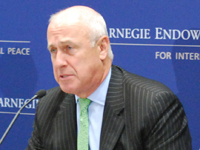Registration
You will receive an email confirming your registration.
In his first official trip to Asia next week, President Obama will visit Japan, Singapore, China, and South Korea in an attempt to reaffirm America’s commitment to the region. Seeking to reverse the perception that the United States has neglected Asia while focusing on the global war on terror, Obama will engage in discussions on a wide range of issues, from cooperation on climate change and economic recovery to military arrangements and nonproliferation. His visit has garnered considerable attention on both sides of the Pacific, with many viewing it as a sign that the United States is finally ready to reengage with this strategically vital region. His message will be: the United States is back, Asia.
Douglas Paal provided an overview of Obama’s visit during a panel highlighting some of Carnegie’s experts on Asia. Michael Pettis addressed the economic aspects of the trip. Taiya Smith and Michael Swaine also spoke respectively on key issues concerning climate change and security in the region.
Economic Rebalancing and Trade Frictions
Michael Pettis explained that, as the world continues working toward economic recovery, the U.S. savings rate is likely to grow in the coming years to correct imbalances in the global system. U.S. consumption has long provided the engine for growth around the world, but as Americans begin to buy less and save more, the global economy must compensate for these changes. Pettis held a pessimistic view of how such rebalancing would happen, arguing that the most positive outcomes are also the most improbable.
- Global investment levels are unlikely to rise, and given the current economic climate, they will probably fall. Thus a decrease in American consumption must be balanced another way and most likely by China.
- Chinese consumption will not grow quickly enough to compensate for increased American savings, Pettis argued. While China’s consumption rate has increased moderately, further growth will remain constrained by stagnant household income levels. This is a result of China’s current development model, which forces households to subsidize otherwise unviable investments, not only through an undervalued exchange rate of the yuan, but also through artificially low interest rates.
- Global economic rebalancing, particularly between the United States and China, will probably be distributed through the trade account. Bilateral trade frictions are thus likely to increase, as U.S. consumption shrinks and China struggles to maintain demand for its growing productive capacity.
Pragmatic Steps on Climate Change
Climate change is one of the top issues on the U.S.-China agenda, and it has received increasing attention from the world because of the upcoming summit in Copenhagen. Smith pointed out that dealing with environmental problems is one of the few areas of common interest in which long-term strategic cooperation between the two countries is possible.
- China has taken significant steps to address environmental problems domestically and will go to Copenhagen with a strong negotiating position. However, the U.S. Congress will probably continue to block progress on any comprehensive agreement, leaving America vulnerable to international criticism that is has not done its part.
Security Reassurances and Stalemates
While there are many critical security issues in Asia, they represent long-term problems on which Obama’s trip is unlikely to achieve any breakthroughs. Swaine suggested that the visit will more likely focus on reassuring Asian countries about U.S. commitment to the region and stressing common objectives.
- The U.S.-Japan alliance will probably dominate Obama’s security discussions.
- Obama’s primary goal at the Asia-Pacific Economic Cooperation (APEC) meeting in Singapore is to reassure Southeast Asia of the robust commitment and continued attention of the United States, especially amidst talk of restructuring the security and economic architecture of the region.
- Improving military ties with China will be high on Obama’s list of priorities in Beijing. He will likely stress the positive aspects of the U.S.-China relationship and push for more and deeper military contacts to diffuse concerns over U.S. surveillance activities and China’s ambitions in space technology and Exclusive Economic Zone claims.
The success of President Obama’s inaugural trip to Asia will be defined by its public relations impact, Paal said. While the visit may not produce notable deliverables or concrete policy changes, it is nonetheless an important symbol that the United States is a committed and capable player in the region.
